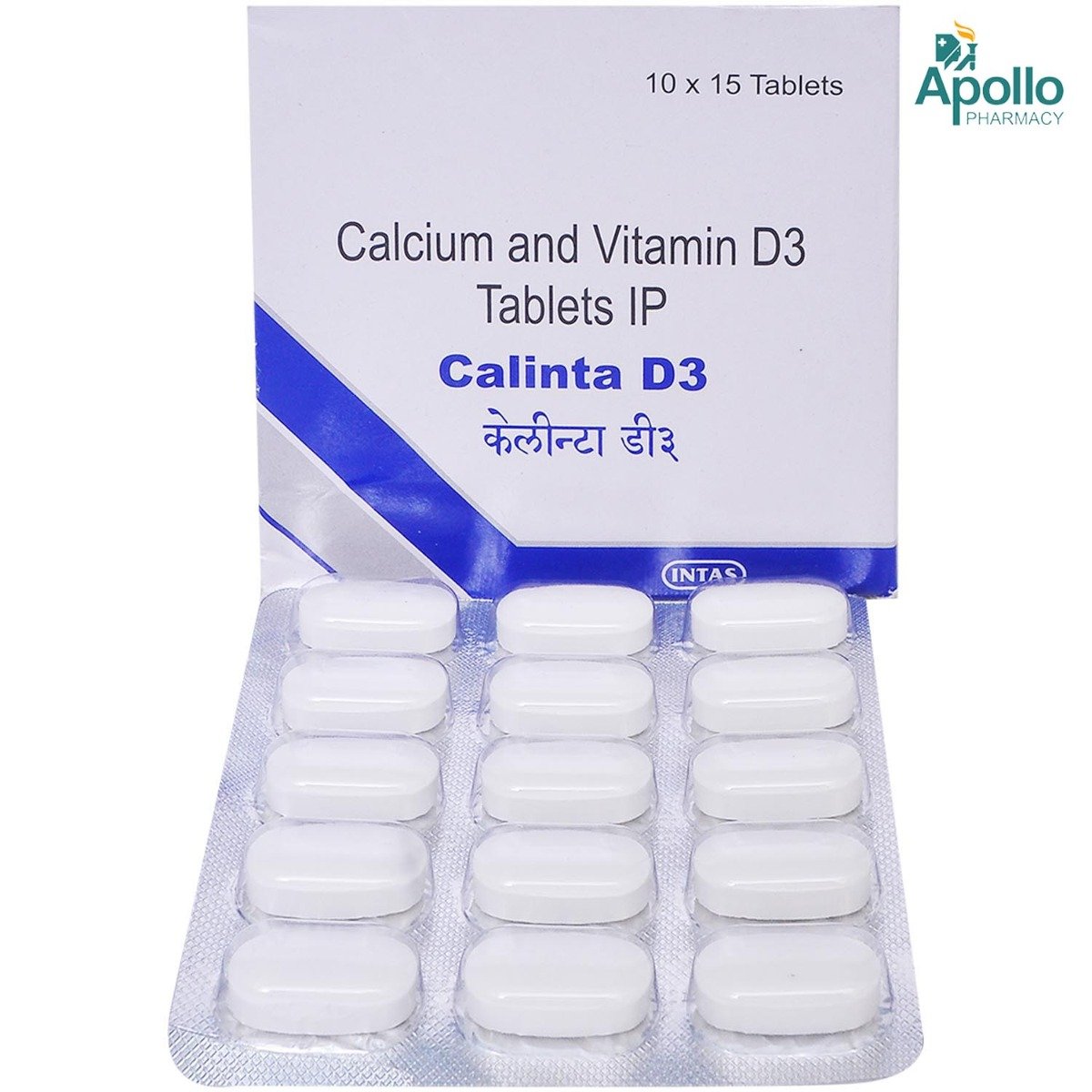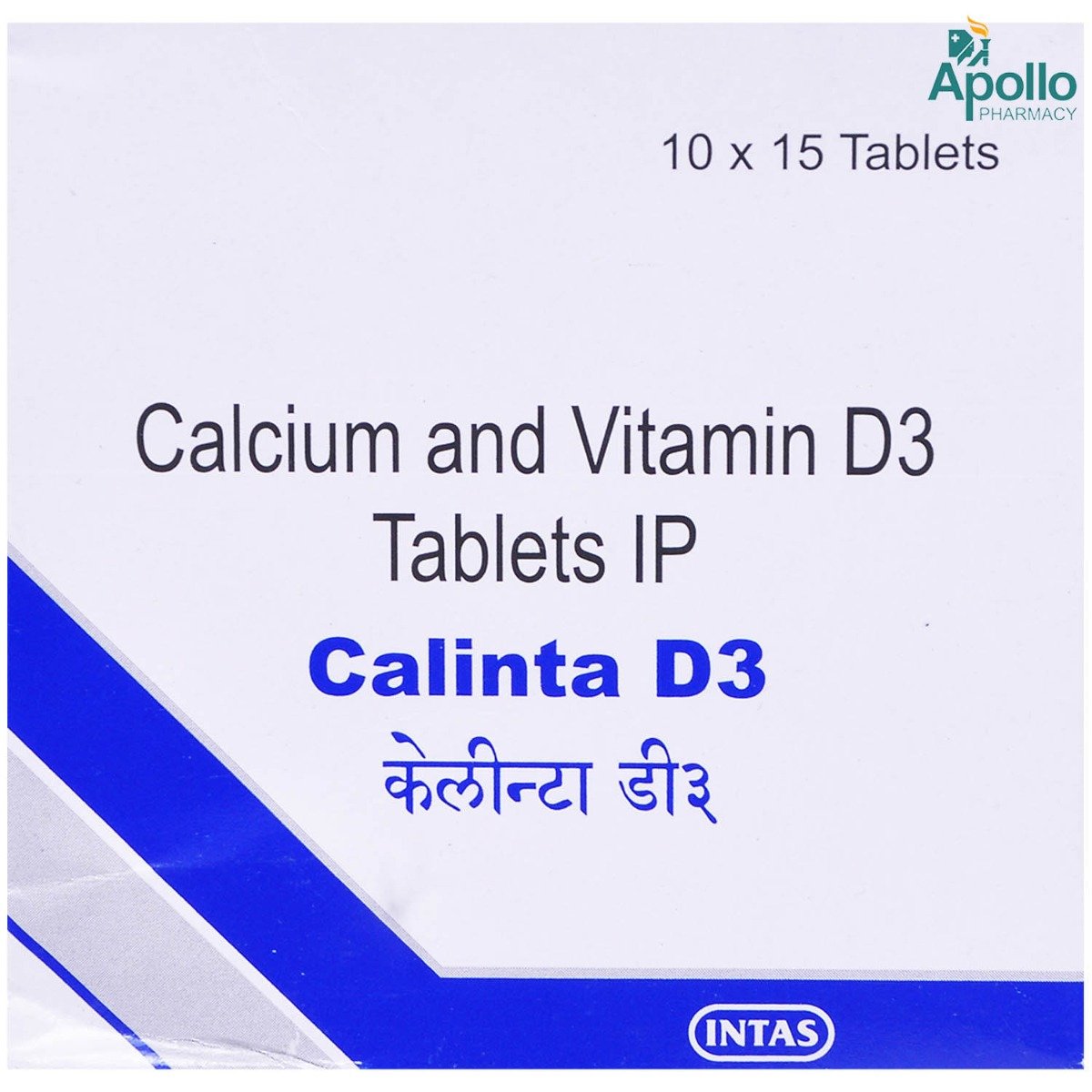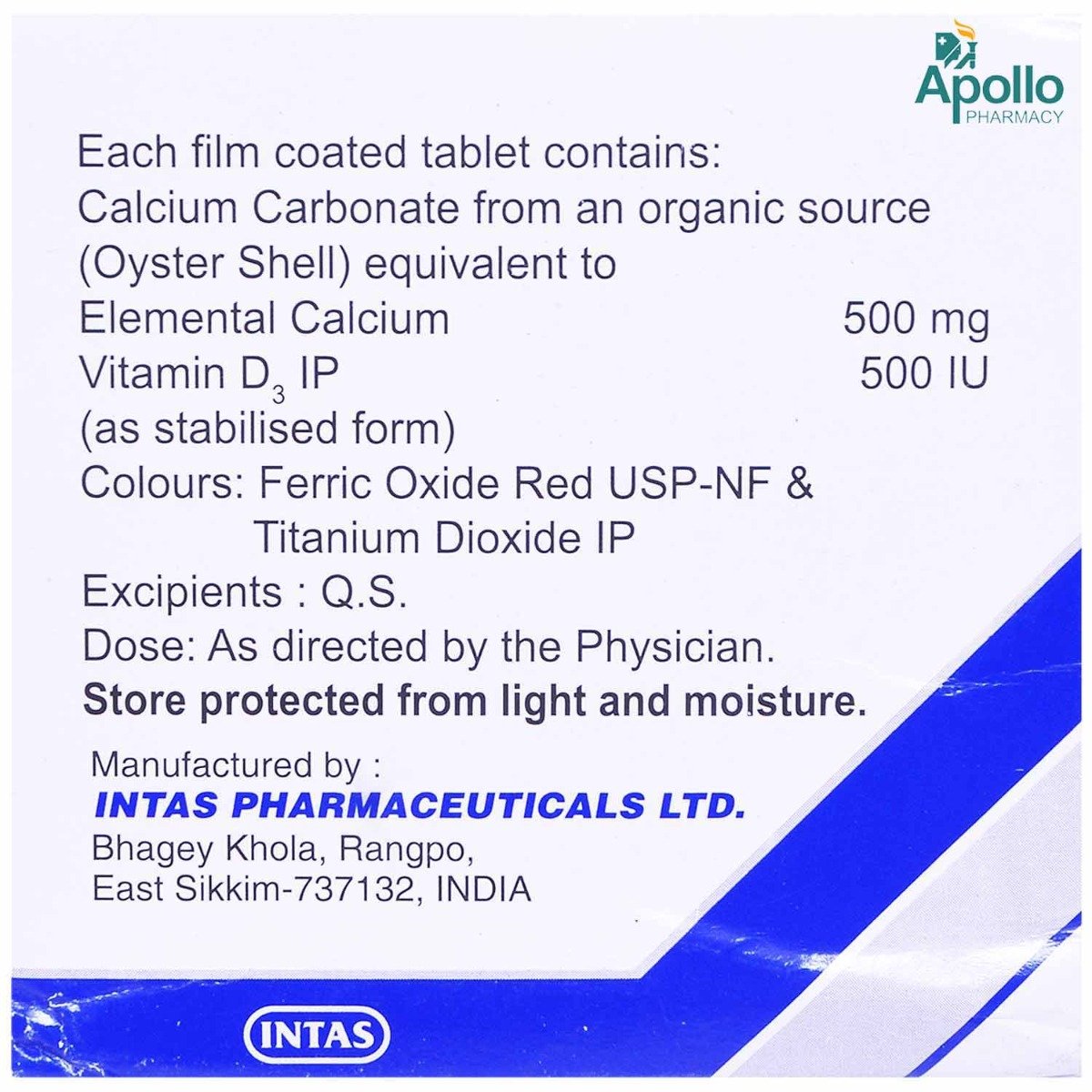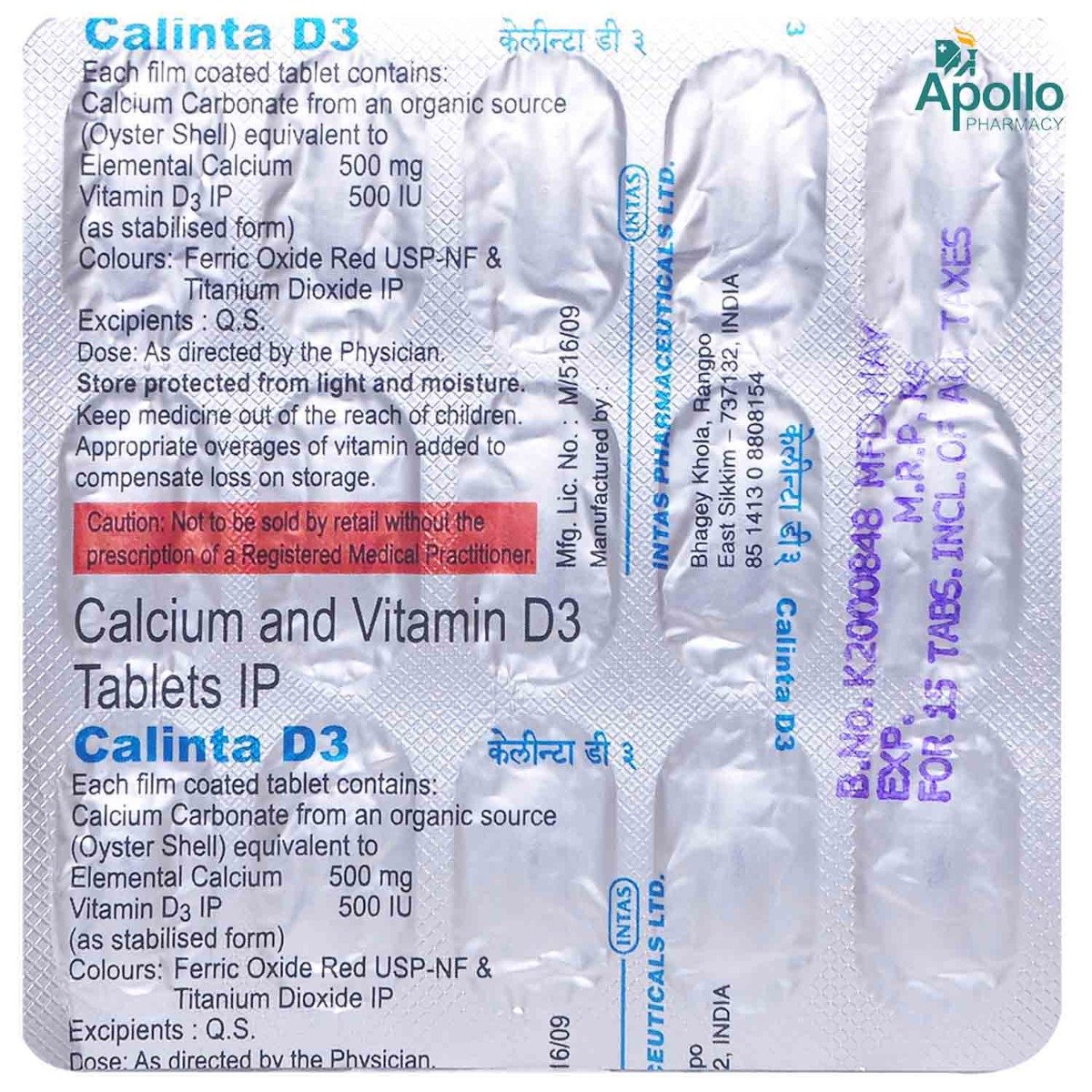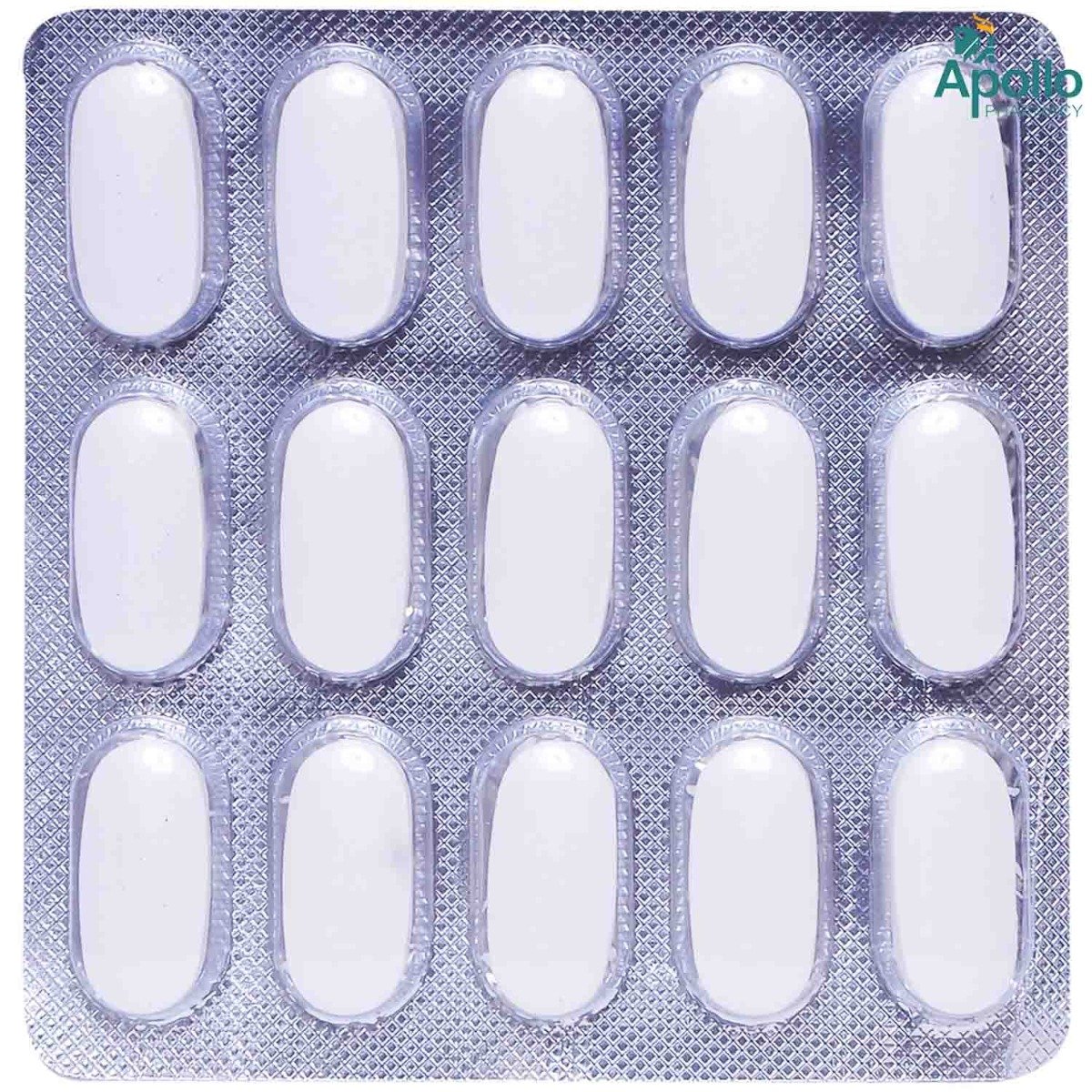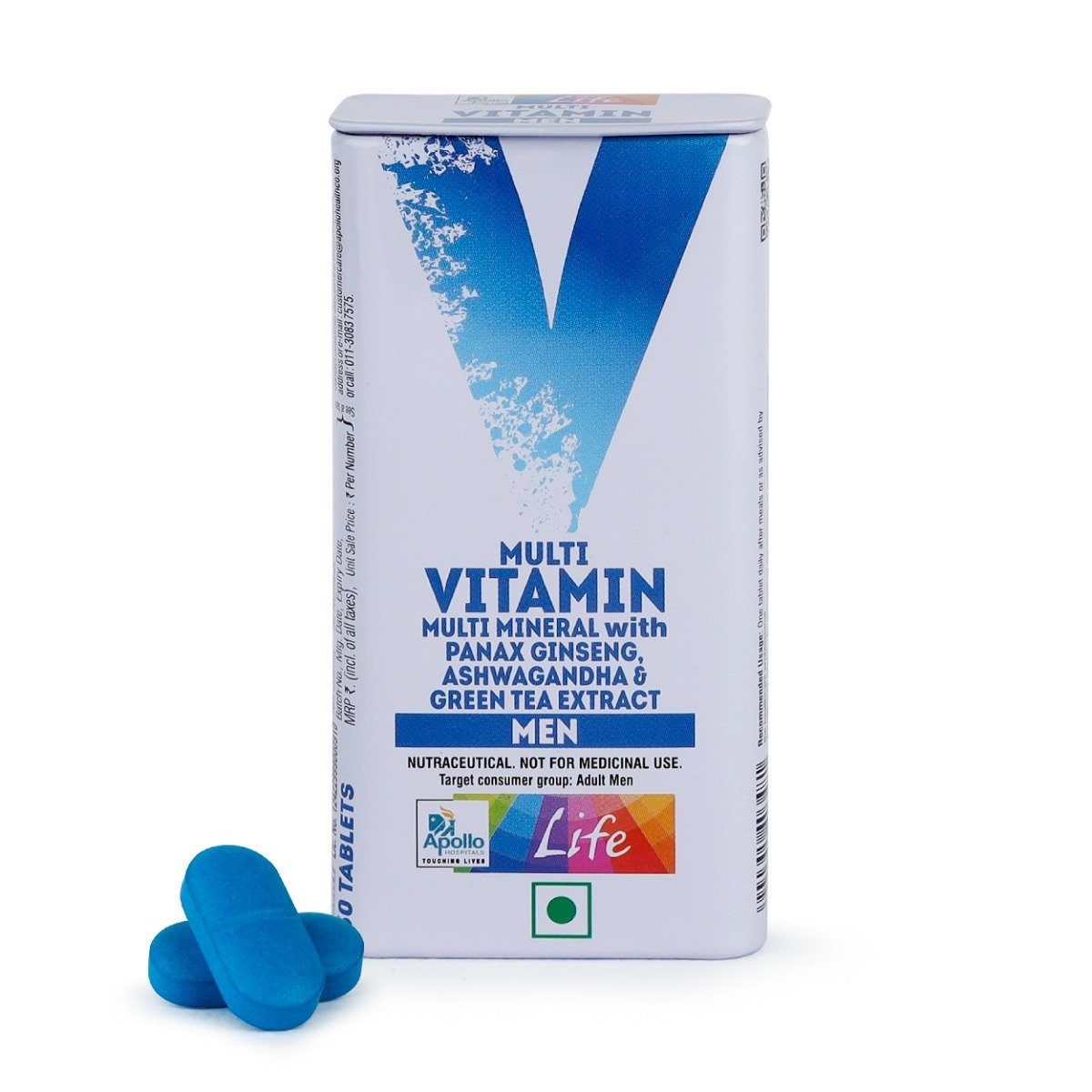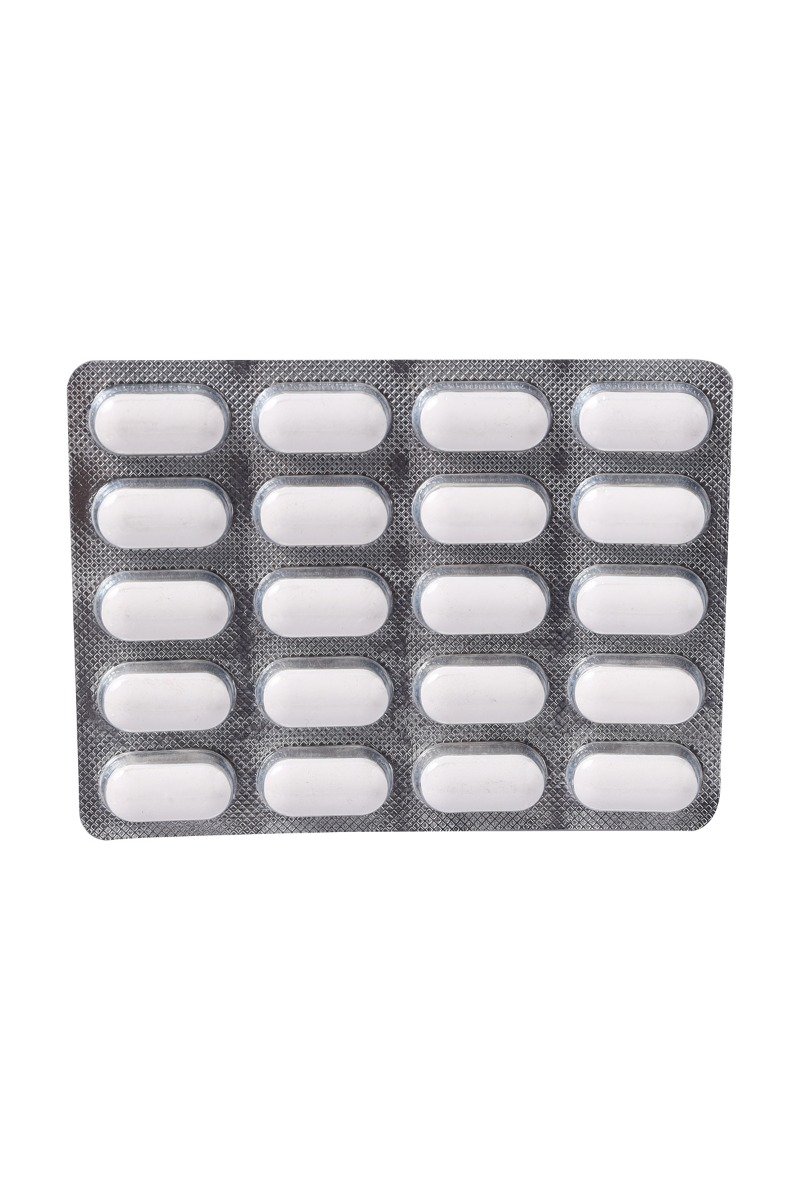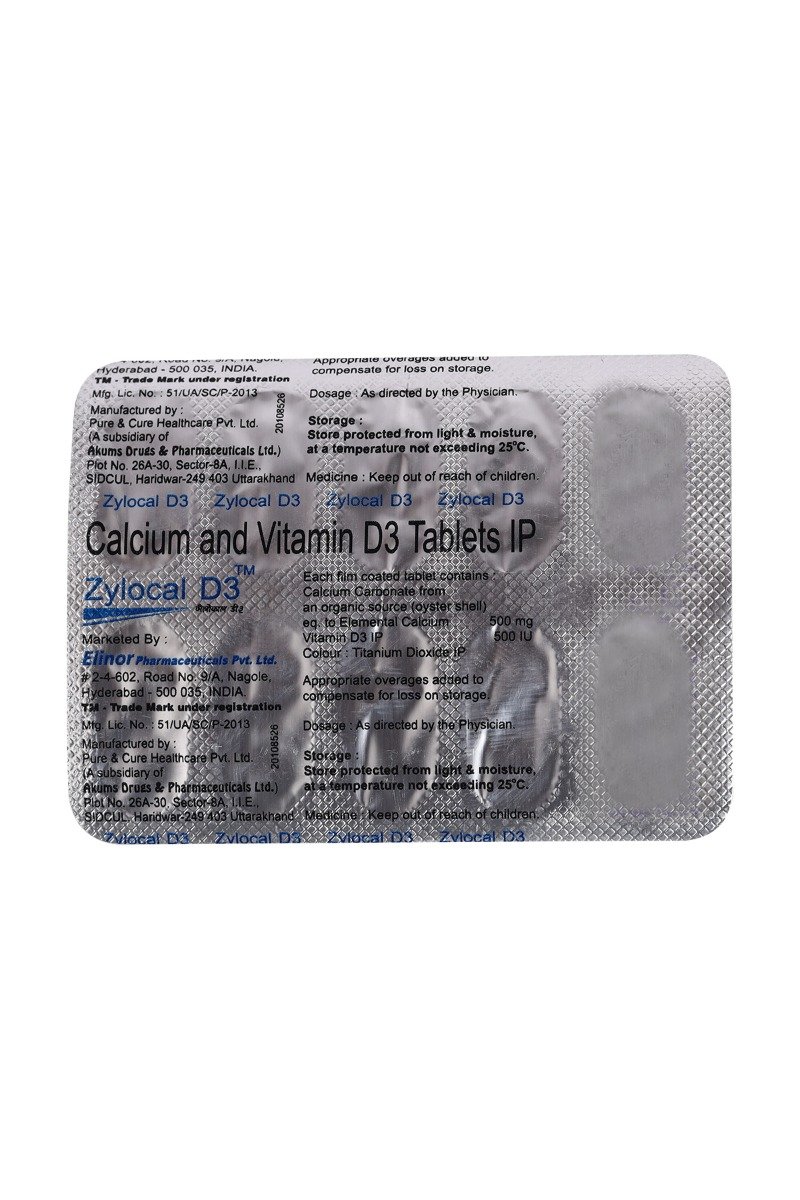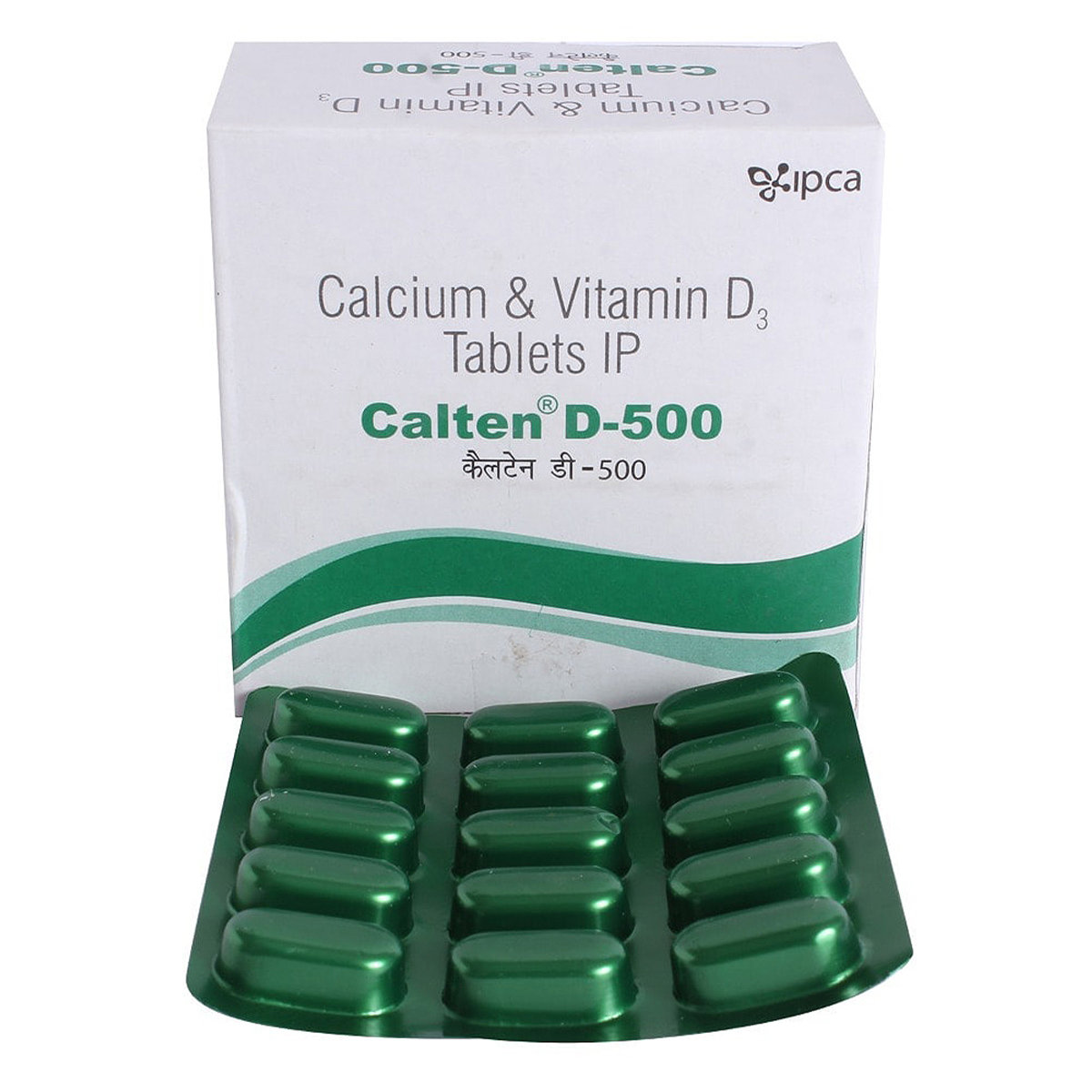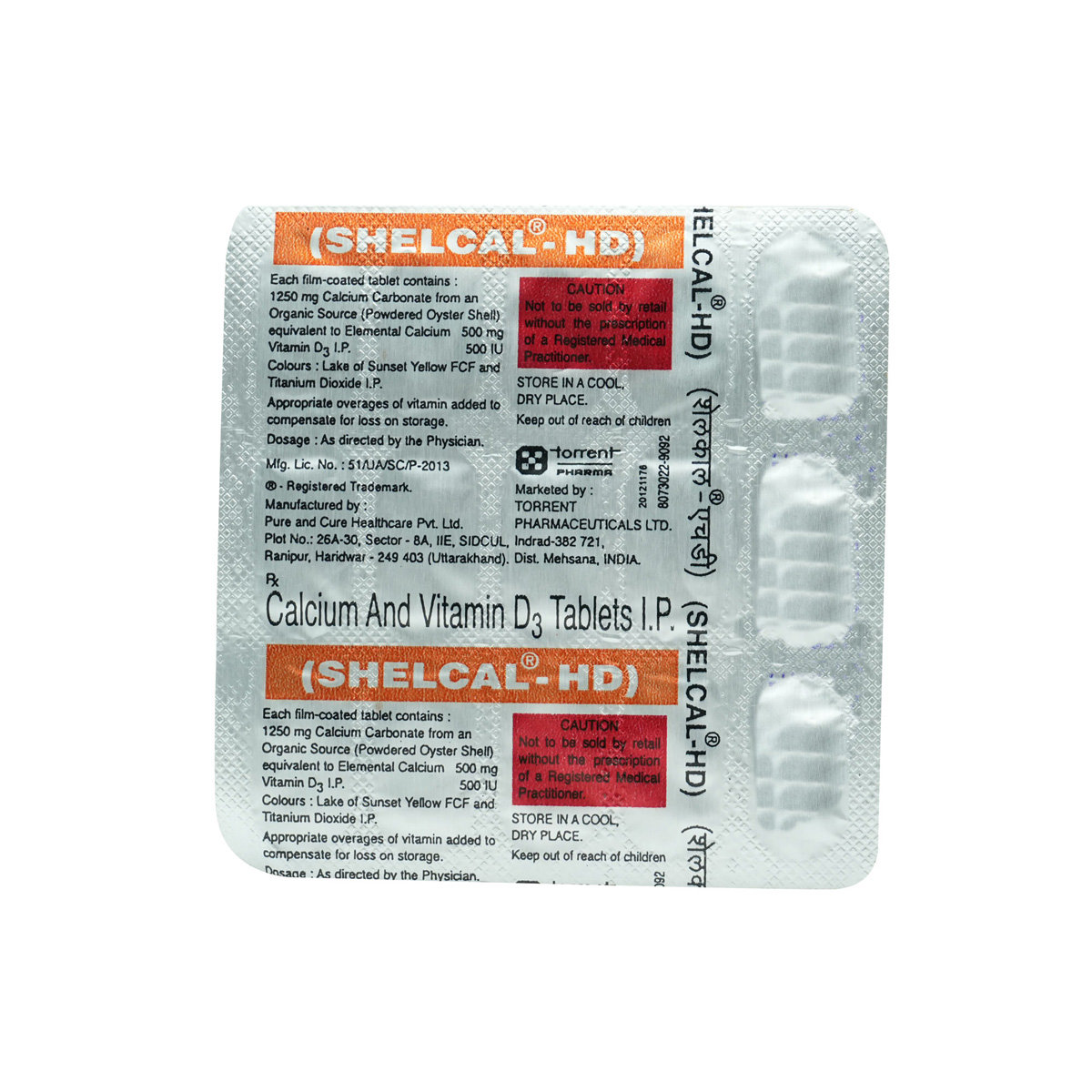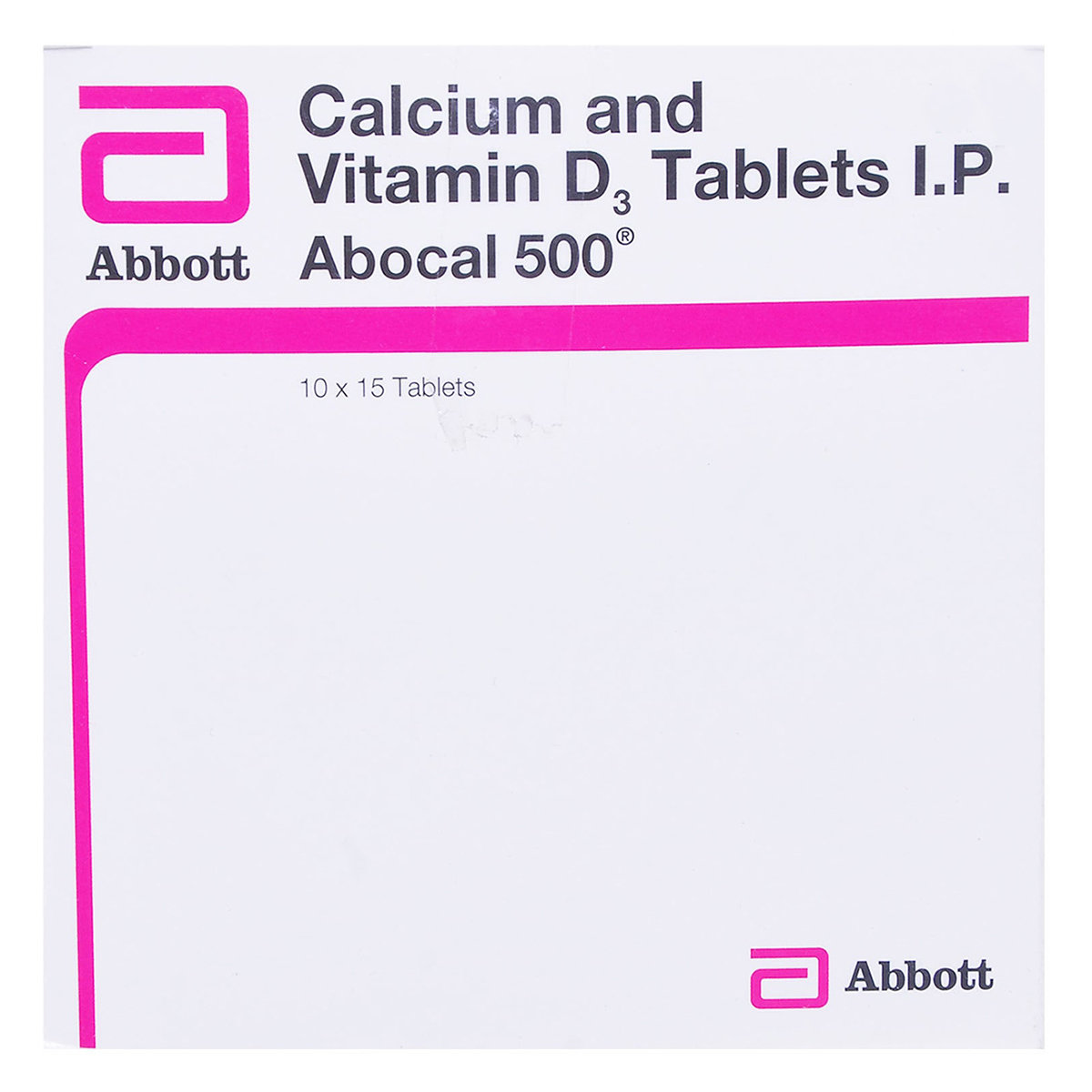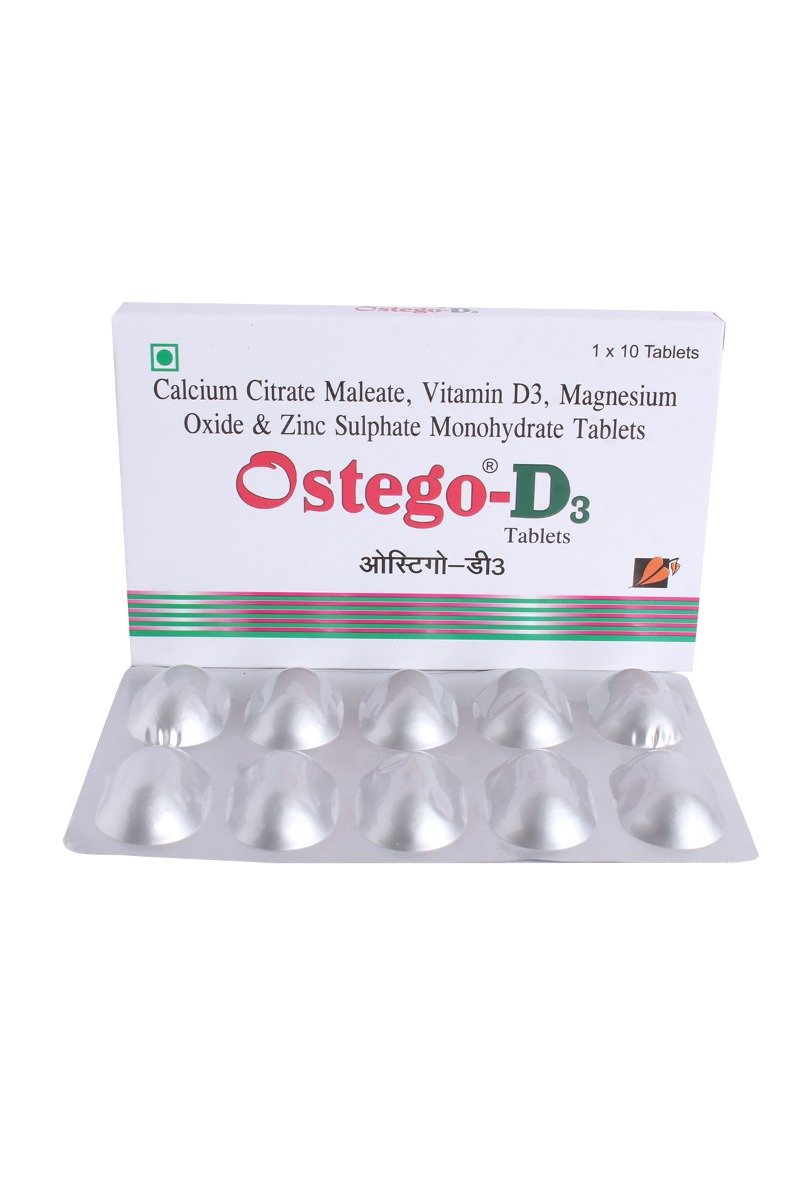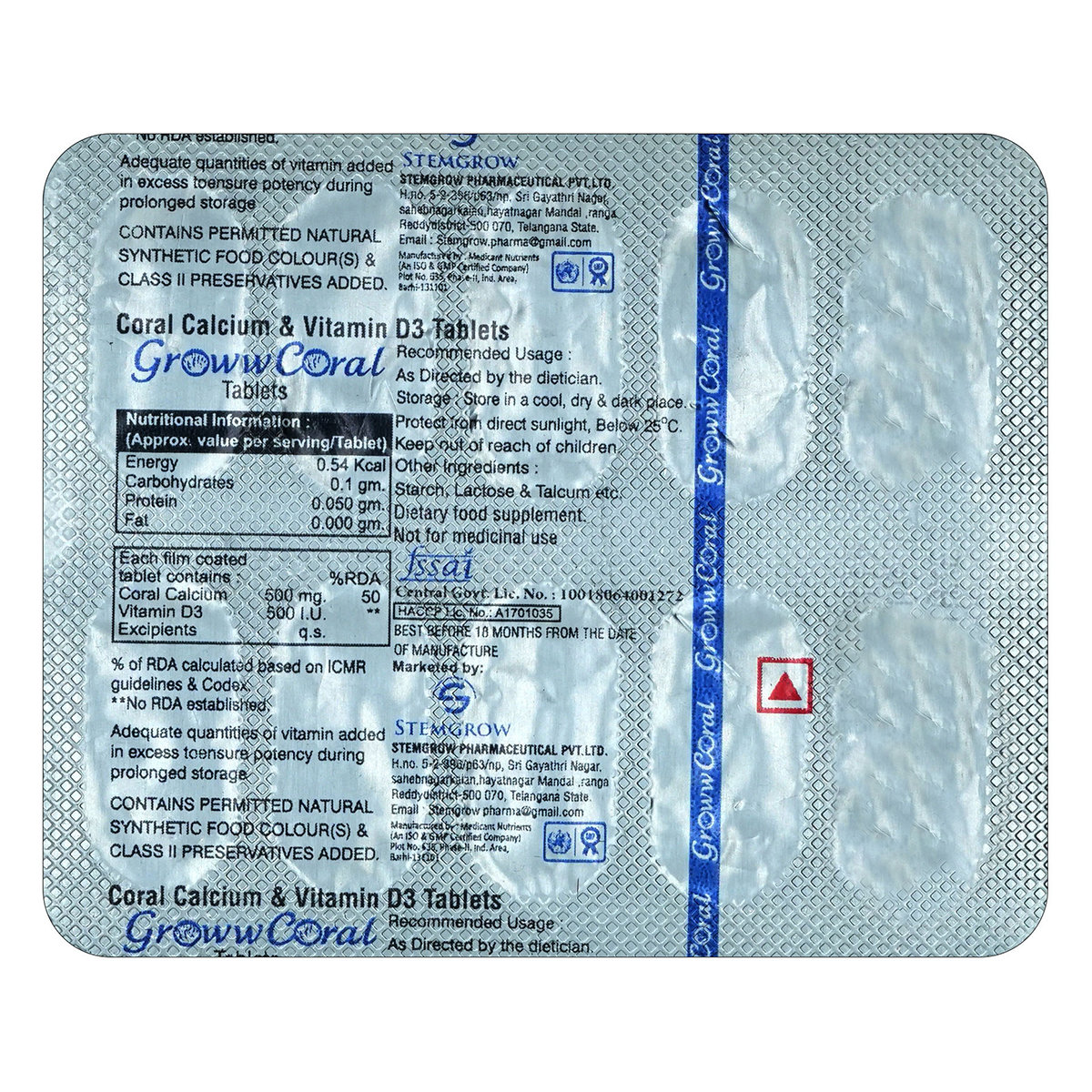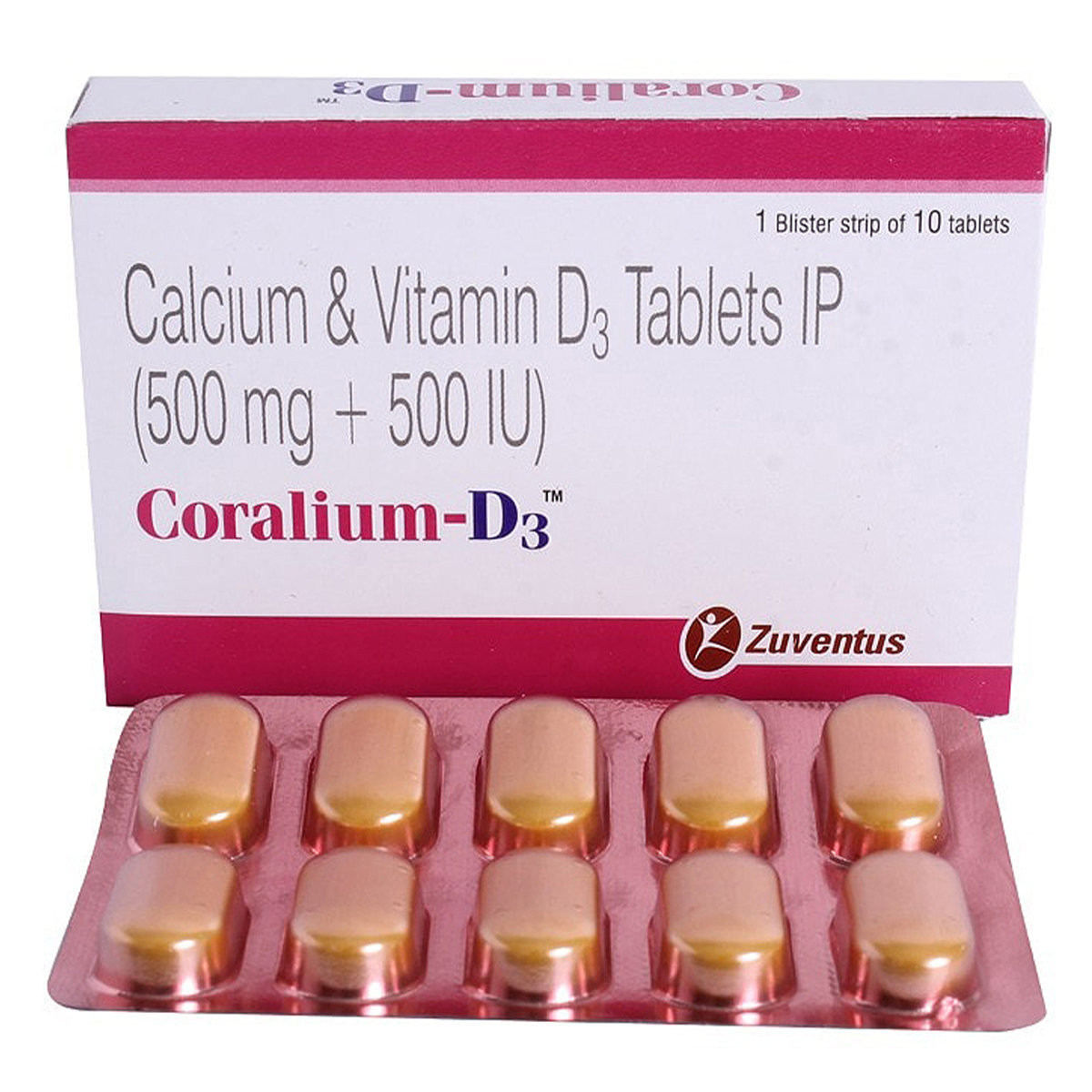Calinta D3 Tablet 15's
MRP ₹158
(Inclusive of all Taxes)
₹23.7 Cashback (15%)
About Calinta D3 Tablet
Calinta D3 Tablet belongs to the class of 'nutritional supplements', primarily used to treat low blood calcium levels. Calinta D3 Tablet effectively treats various conditions caused by low calcium levels in the body like Vitamin D deficiency, osteoporosis (weak and brittle bones), hypoparathyroidism (parathyroid glands make low levels of calcium in the body), latent tetany (a muscle disease with low blood calcium levels), and rickets or osteomalacia (softening or deforming of bones due to lack of calcium). Vitamin D deficiency occurs when your body has low Vitamin D levels and is caused due to inadequate nutrition, intestinal malabsorption, or lack of sunlight exposure.
Calinta D3 Tablet consists Calcium (mineral) and Cholecalciferol (Vitamin D3). Calcium is a mineral that is used to prevent or treat a calcium deficiency. It provides essential nutrients to maintain bone formation and maintenance. Cholecalciferol is a form of Vitamin D and helps maintain blood calcium and phosphorus levels and bone mineralisation. It is used to treat and prevent bone disorders, such as rickets and osteomalacia.
Your doctor will decide the dosage based on your medical condition. Calinta D3 Tablet is likely safe to consume. In some cases, it may cause side effects like constipation and stomach upset. These side effects do not require medical attention and gradually resolve over time.
If you are known to be allergic to Calinta D3 Tablet or its inactive components, inform your doctor. Please tell your doctor if you have heart/kidney/liver/blood vessel diseases, kidney stones, hypercalcaemia (high calcium levels), hypervitaminosis D (high vitamin D levels), low levels of bile, phosphate imbalance, and malabsorption syndrome (difficulty absorbing nutrition from food) before starting Calinta D3 Tablet . Pregnant or breastfeeding women should consult their doctor before taking Calinta D3 Tablet .This supplement is safe to use in children when advised by the doctor.
Country of origin
Manufacturer/Marketer address
Online payment accepted

secured payment

india's most trusted pharmacy

genuine products
Composition :
Manufacturer/Marketer :
Consume Type :
Expires on or after :
Return Policy :
Provide Delivery Location
About Calinta D3 Tablet
Calinta D3 Tablet belongs to the class of 'nutritional supplements', primarily used to treat low blood calcium levels. Calinta D3 Tablet effectively treats various conditions caused by low calcium levels in the body like Vitamin D deficiency, osteoporosis (weak and brittle bones), hypoparathyroidism (parathyroid glands make low levels of calcium in the body), latent tetany (a muscle disease with low blood calcium levels), and rickets or osteomalacia (softening or deforming of bones due to lack of calcium). Vitamin D deficiency occurs when your body has low Vitamin D levels and is caused due to inadequate nutrition, intestinal malabsorption, or lack of sunlight exposure.
Calinta D3 Tablet consists Calcium (mineral) and Cholecalciferol (Vitamin D3). Calcium is a mineral that is used to prevent or treat a calcium deficiency. It provides essential nutrients to maintain bone formation and maintenance. Cholecalciferol is a form of Vitamin D and helps maintain blood calcium and phosphorus levels and bone mineralisation. It is used to treat and prevent bone disorders, such as rickets and osteomalacia.
Your doctor will decide the dosage based on your medical condition. Calinta D3 Tablet is likely safe to consume. In some cases, it may cause side effects like constipation and stomach upset. These side effects do not require medical attention and gradually resolve over time.
If you are known to be allergic to Calinta D3 Tablet or its inactive components, inform your doctor. Please tell your doctor if you have heart/kidney/liver/blood vessel diseases, kidney stones, hypercalcaemia (high calcium levels), hypervitaminosis D (high vitamin D levels), low levels of bile, phosphate imbalance, and malabsorption syndrome (difficulty absorbing nutrition from food) before starting Calinta D3 Tablet . Pregnant or breastfeeding women should consult their doctor before taking Calinta D3 Tablet .This supplement is safe to use in children when advised by the doctor.
Uses of Calinta D3 Tablet
Key Benefits
Calinta D3 Tablet consists of Calcium (mineral) and Cholecalciferol (Vitamin D3). Calcium is a mineral that is used to prevent or treat a calcium deficiency. It provides essential nutrients to maintain bone formation and maintenance. Cholecalciferol helps maintain blood calcium and phosphorus levels and mineralization of bone.
Directions for Use
Storage
Side Effects of Calinta D3 Tablet
- Constipation
- Stomach upset
Drug Warnings
Let your doctor know if you are allergic to Calinta D3 Tablet or its inactive components. Calinta D3 Tablet is not recommended if you have hypercalcaemia (high calcium levels), hypervitaminosis D (high vitamin D levels), and malabsorption syndrome (difficulty absorbing nutrition from food). Brief your medical history if you have any heart/kidney/liver/blood vessel diseases, kidney stones, sarcoidosis (growth of inflammatory cells in different parts of the body), Crohn's disease (inflammatory bowel disease), Whipple's disease (bacterial infection affecting joints and digestive system), achlorhydria (little or no stomach acid), low levels of bile, and phosphate imbalance. It is advised to check with your doctor before using Calinta D3 Tablet if you are pregnant or breastfeeding. Drinking alcohol may affect calcium absorption; therefore, it is advised to limit alcohol intake while using Calinta D3 Tablet . Calinta D3 Tablet is safe to use in children when advised by the doctor. Do not store Calinta D3 Tablet above 25°C.
Drug Interactions
Drug-Drug Interactions: Calinta D3 Tablet may interact with drugs treating high cholesterol levels (cholestyramine, colestipol), antibiotics (doxycycline, ciprofloxacin, penicillin), anti-cancer drugs (estramustine), drugs treating bone loss (alendronate), thyroid hormone (levothyroxine), weight-loss drugs (orlistat), fits medicines (phenobarbital), mineral oils (paraffin), water pills (furosemide), and heart-related medicines (digitoxin).
Drug-Food Interactions: Avoid or reduce the intake of caffeine, soft drinks, and alcohol that inhibit calcium absorption.
Drug-Disease Interactions: Before using Calinta D3 Tablet , consult your doctor if you have hypercalcemia, hypervitaminosis D, malabsorption syndrome, Vitamin D toxicity, heart/kidney/liver/blood vessel diseases, kidney stones, sarcoidosis, Crohn's disease, Whipple's disease, achlorhydria, low levels of bile, phosphate imbalance, diabetes, and phenylketonuria.
Drug-Drug Interactions Checker List
- CHOLESTYRAMINE
- COLESTIPOL
- DOXYCYCLINE
- CIPROFLOXACIN
- PENICILLIN
- ESTRAMUSTINE
- ALENDRONATE SODIUM
- LEVOTHYROXINE
- ORLISTAT
- PHENOBARBITAL
- PARAFFIN
- FUROSEMIDE
- DIGITOXIN
Habit Forming
Diet & Lifestyle Advise
- Include dairy products like milk, yoghurt, cheese or milk-based custard in your diet.
- Eat daily a serving of broccoli, cabbage, bok choy, spinach and other green leafy vegetables.
- Include the best dietary sources of vitamin D, such as fish liver oils and vitamin D–fortified milk.
- Snack on calcium-rich nuts like Brazil nuts or almonds.
- Sprinkle sesame seeds over your food, vegetables and salads. Sesame seeds are high in calcium.
- Avoid or reduce the intake of caffeine, soft drinks and alcohol that inhibit the calcium absorption.
- Replace the meat with tofu or tempeh for extra calcium in your food.
Special Advise
- Calinta D3 Tablet may interfere with cholesterol tests, hence please inform your doctor and laboratory staff that you are taking Calinta D3 Tablet before undergoing blood tests.
- Clinical monitoring of serum electrolyte concentrations and cardiac function is recommended.
Disease/Condition Glossary
Vitamin D deficiency: When a person cannot get enough Vitamin D through food and exposure to sunlight, it leads to vitamin D deficiency. It often leads to thin, brittle, or misshapen bones.
Osteoporosis: It is a bone disease that causes weak and brittle bones by decreasing bone density.
Tetany: A disease condition due to low levels of calcium (hypocalcemia) in the body that causes cramps and spasms in the hands, feet, and larynx (voice box).
Osteomalacia/Rickets: A disease caused by softening and weakening bones in children due to inadequate vitamin D. Hypoparathyroidism: It is a disease characterized by low parathyroid hormone levels. This can cause low calcium levels and trigger tetany (muscle cramps, spasms or tremors).
FAQs
Disclaimer
Alcohol
Safe if prescribed
Drinking alcohol can affect the calcium absorption, hence it is advised to limit the alcohol intake while using Calinta D3 Tablet .
Pregnancy
Consult your doctor
During pregnancy, use higher doses of Calinta D3 Tablet than the daily dietary allowance only when advised by the doctor. Your doctor will weigh the potential risks and benefits before recommending Calinta D3 Tablet .
Breast Feeding
Consult your doctor
Consult your doctor before taking Calinta D3 Tablet if you are breastfeeding.
Driving
Safe if prescribed
Calinta D3 Tablet is usually safe and does not interact with your driving ability.
Liver
Consult your doctor
Let your doctor know if you have any history of liver diseases before taking Calinta D3 Tablet .
Kidney
Consult your doctor
It is advised to seek doctor advice before starting Calinta D3 Tablet if you have kidney diseases like kidney stones or undergoing dialysis. Caution should be taken in patients undergoing dialysis before starting Calinta D3 Tablet .
Children
Safe if prescribed
The doctor will decide the dosage of Calinta D3 Tablet based on the child's age and weight.
Author Details
We provide you with authentic, trustworthy and relevant information
Uses of Calinta D3 Tablet
Key Benefits
Calinta D3 Tablet consists of Calcium (mineral) and Cholecalciferol (Vitamin D3). Calcium is a mineral that is used to prevent or treat a calcium deficiency. It provides essential nutrients to maintain bone formation and maintenance. Cholecalciferol helps maintain blood calcium and phosphorus levels and mineralization of bone.
Directions for Use
Storage
Drug Warnings
Let your doctor know if you are allergic to Calinta D3 Tablet or its inactive components. Calinta D3 Tablet is not recommended if you have hypercalcaemia (high calcium levels), hypervitaminosis D (high vitamin D levels), and malabsorption syndrome (difficulty absorbing nutrition from food). Brief your medical history if you have any heart/kidney/liver/blood vessel diseases, kidney stones, sarcoidosis (growth of inflammatory cells in different parts of the body), Crohn's disease (inflammatory bowel disease), Whipple's disease (bacterial infection affecting joints and digestive system), achlorhydria (little or no stomach acid), low levels of bile, and phosphate imbalance. It is advised to check with your doctor before using Calinta D3 Tablet if you are pregnant or breastfeeding. Drinking alcohol may affect calcium absorption; therefore, it is advised to limit alcohol intake while using Calinta D3 Tablet . Calinta D3 Tablet is safe to use in children when advised by the doctor. Do not store Calinta D3 Tablet above 25°C.
Therapeutic Class
Drug-Drug Interactions
Drug-Drug Interactions
Login/Sign Up
Co-administration of Calinta D3 Tablet with Ketoconazole may decrease the effects of Ketoconazole.
How to manage the interaction:
Although there is an interaction, Calinta D3 Tablet can be taken with Ketoconazole if prescribed by the doctor. However, maintain a gap of 2 or more hours between both medicines. Do not discontinue the medication without consulting a doctor.
Co-administration of Calinta D3 Tablet may lower the effectiveness of Patiromer calcium in binding potassium.
How to manage the interaction:
Although there is an interaction, Calinta D3 Tablet can be taken with Patiromer calcium if prescribed by the doctor. Consult the prescriber if you experience symptoms such as metabolic alkalosis like nausea, vomiting, tremor, muscle twitching, lightheadedness, numbness or tingling, prolonged muscle spasms, slowed breathing, irregular heartbeat, and confusion. Do not discontinue the medication without a doctor's advice.
Co-administration of Dolutegravir with Calinta D3 Tablet can reduce the effectiveness of dolutegravir.
How to manage the interaction:
Although there is an interaction, Calinta D3 Tablet can be taken with dolutegravir if prescribed by the doctor. However, dolutegravir and Calinta D3 Tablet should not be taken orally at the same time. Maintain a gap of 2-6 hours between both medicines. Do not discontinue using any medications without consulting a doctor.
Co-administration of Calinta D3 Tablet may interfere with the absorption of Raltegravir and reduce its effectiveness.
How to manage the interaction:
Taking Calinta D3 Tablet with Raltegravir should be avoided. Consult the doctor if you have any concerns, the doctor may recommend alternatives that do not interact with raltegravir. Do not discontinue the medication without consulting a doctor.
Co-administration of Calinta D3 Tablet and Digoxin may increase the calcium levels may increase the effects of Digoxin
How to manage the interaction:
Although there is an interaction, Calinta D3 Tablet can be taken with Digoxin if prescribed by the doctor. Do not discontinue the medication without consulting a doctor.
Co-administration of Calinta D3 Tablet may interfere with the absorption of Gefitinib and reduce its effectiveness.
How to manage the interaction:
Although there is an interaction, Calinta D3 Tablet can be taken with Gefitinib if prescribed by the doctor. However, Gefitinib and Calinta D3 Tablet should not be taken orally at the same time. Maintain a gap of 2-6 hours between both medicines. Do not discontinue using any medications without consulting a doctor.
The combined use of aluminum hydroxide with Calinta D3 Tablet may increase the risk of toxicity.
How to manage the interaction:
Co-administration of Calinta D3 Tablet with Aluminium hydroxide can possibly result in an interaction, but it can be taken if your doctor has advised it. If you're having any of these symptoms like bone pain, muscle weakness, anemia, seizures, or dementia, it's important to contact your doctor right away. Do not stop using any medications without a doctor's advice.
The combined use of calcifediol with cholecalciferol can increase the risk of side effects.
How to manage the interaction:
Although there is a possible interaction between Calinta D3 Tablet and calcifediol, you can take these medicines together if prescribed by your doctor. If you notice any of these symptoms - irregular heartbeat, seizures, weakness, tiredness, headache, dizziness, ringing in the ears, loss of appetite, feeling sick, dry mouth, strange taste in your mouth, muscle or bone pain, thirst, losing weight, eye infection, sensitivity to light, runny nose or itching - contact a doctor right away. Do not discontinue any medications without consulting a doctor.
Cholecalciferol and doxercalciferol are forms of vitamin D, and taking too much vitamin D may lead to toxic effects.
How to manage the interaction:
Although there is a possible interaction between Calinta D3 Tablet and doxercalciferol, you can take these medicines together if prescribed by your doctor. If you notice any of these symptoms - irregular heartbeat, seizures, weakness, tiredness, headache, dizziness, ringing in the ears, loss of appetite, feeling sick, dry mouth, strange taste in your mouth, muscle or bone pain, thirst, losing weight, eye infection, sensitivity to light, runny nose or itching - make sure to call a doctor right away. Do not discontinue any medications without consulting a doctor.
Co-administration of Cholecalciferol and Calcitriol are forms of vitamin D, and taking too much vitamin D may lead to toxic effects.
How to manage the interaction:
Although there is a possible interaction between Calinta D3 Tablet and calcitriol, you can take these medicines together if prescribed by your doctor. If you notice any of these symptoms - irregular heartbeat, seizures, weakness, tiredness, headache, dizziness, ringing in the ears, loss of appetite, feeling sick, dry mouth, strange taste in your mouth, muscle or bone pain, thirst, losing weight, eye infection, sensitivity to light, runny nose or itching - contact a doctor right away. Do not discontinue any medications without consulting a doctor.
Drug-Drug Interactions Checker List
- CHOLESTYRAMINE
- COLESTIPOL
- DOXYCYCLINE
- CIPROFLOXACIN
- PENICILLIN
- ESTRAMUSTINE
- ALENDRONATE SODIUM
- LEVOTHYROXINE
- ORLISTAT
- PHENOBARBITAL
- PARAFFIN
- FUROSEMIDE
- DIGITOXIN
Diet & Lifestyle Advise
- Include dairy products like milk, yoghurt, cheese or milk-based custard in your diet.
- Eat daily a serving of broccoli, cabbage, bok choy, spinach and other green leafy vegetables.
- Include the best dietary sources of vitamin D, such as fish liver oils and vitamin D–fortified milk.
- Snack on calcium-rich nuts like Brazil nuts or almonds.
- Sprinkle sesame seeds over your food, vegetables and salads. Sesame seeds are high in calcium.
- Avoid or reduce the intake of caffeine, soft drinks and alcohol that inhibit the calcium absorption.
- Replace the meat with tofu or tempeh for extra calcium in your food.
Habit Forming
Side Effects of Calinta D3 Tablet
- Constipation
- Stomach upset
Special Advise
- Calinta D3 Tablet may interfere with cholesterol tests, hence please inform your doctor and laboratory staff that you are taking Calinta D3 Tablet before undergoing blood tests.
- Clinical monitoring of serum electrolyte concentrations and cardiac function is recommended.
Disease/Condition Glossary
Vitamin D deficiency: When a person cannot get enough Vitamin D through food and exposure to sunlight, it leads to vitamin D deficiency. It often leads to thin, brittle, or misshapen bones.
Osteoporosis: It is a bone disease that causes weak and brittle bones by decreasing bone density.
Tetany: A disease condition due to low levels of calcium (hypocalcemia) in the body that causes cramps and spasms in the hands, feet, and larynx (voice box).
Osteomalacia/Rickets: A disease caused by softening and weakening bones in children due to inadequate vitamin D. Hypoparathyroidism: It is a disease characterized by low parathyroid hormone levels. This can cause low calcium levels and trigger tetany (muscle cramps, spasms or tremors).
All Substitutes & Brand Comparisons
RX
Out of StockCALDIMOR TABLET
Intas Pharmaceuticals Ltd
₹60
(₹3.6 per unit)
62% CHEAPERRX
Zoycal D Tablet 15's
₹75
(₹4.5 per unit)
52% CHEAPERRX
Ostebon Plus Tablet 20's
Aristo Pharmaceuticals Pvt Ltd
₹104
(₹4.68 per unit)
50% CHEAPER

Have a query?

